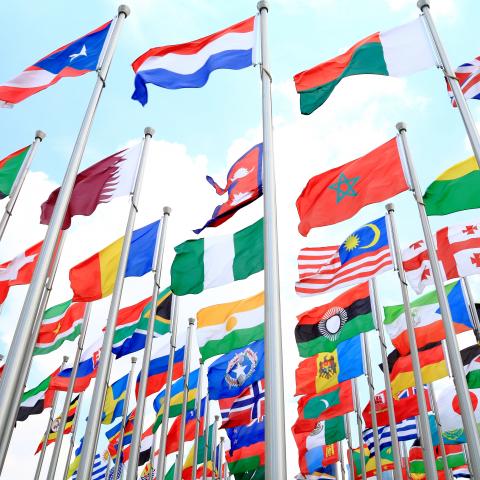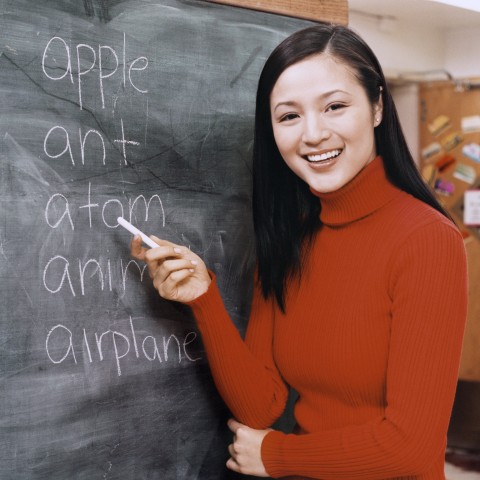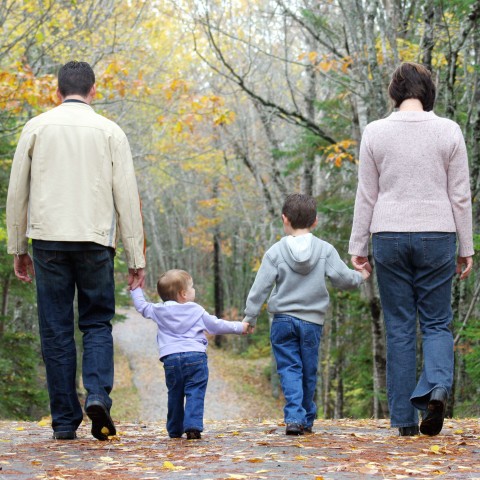Good communication starts with introducing yourself the right way. If you want to start interacting with Bulgarian people, start a new job in Bulgaria, or simply be well-accepted in the company of Bulgarian friends, remove all the barriers and start the conversation in Bulgarian. Where to start?
Let’s begin with a simple “Hello, my name is…” in Bulgarian. Ready? With BulgarianPod101.com, it’s much easier than you think! Learn how to introduce yourself in Bulgarian today.
Table of Contents
- How to Start
- Identifying Yourself
- Placing Yourself in Society
- Introducing Your Family
- Sharing Personal Details
- Exercise: Example of a good conversation starter in Bulgarian
- Conclusion
1. How to Start
One of the most important words in Bulgarian to introduce yourself is “hello.”
Informal situations
In an informal situation, you can just start with Здравей (Zdravey) or Здрасти (Zdrasti), when speaking to one person. When introducing yourself to more people, use Здравейте (Zdraveyte). All of these words mean “Hello” or “Hi.”
Formal situations
To introduce yourself in Bulgarian in formal situations, it’s good to start either with Здравейте (Zdraveyte), meaning “Hello,” which is perfectly okay. But you can also start off with:
- Добро утро (Dobro utro) — Good morning
- Добър ден (Dobеr den) — Good afternoon
- Добър вечер (Dobеr vecher) — Good evening
You can add to this initial greeting:
- Разрешете да се представя (Razreshete da se predstavya) — Let me introduce myself.
That way, you’ll grab everyone’s attention. And now, it’s time to tell about yourself in Bulgarian.
2. Identifying Yourself
1- What’s your name?
So let’s start with “My name is…” in Bulgarian. Below is the informal way of introducing yourself in Bulgarian. Put your first name, or even your nickname, in place of the dots and start practicing right away!
- Казвам се… (Kazvam se…) — My name is…
In an informal conversation, you can give people your preferred name, what you want other people to call you. For example, if your name is Alexander, but you prefer to be called Alex, just say:
- Казвам се Алекс. (Kazvam se Alex.) — My name is Alex.
This phrase is usually accompanied by a handshake, which shows the beginning of an eventual friendship. Then, you can ask your interlocutor to introduce himself/herself:
- А ти как се казваш? (A ti kak se kazvash?) — And what’s your name?
Or
- A как е твоето име? (A kak e tvoeto ime?) — And what’s your name?
The formal way of introducing yourself in Bulgarian is with the same Bulgarian phrase, but instead of placing your first name or nickname, give your full name.
- Казвам се Александър Уайт. (Kazvam se Alexander White.) — My name is Alexander White.
If your interlocutor has introduced himself first and has reached out his hand for a handshake, you’re expected to reply “Nice to meet you,” in Bulgarian:
- Много ми е приятно. Казвам се … (Mnogo mi e priyatno. Kazvam se…) — Nice to meet you. My name is…
In the place of dots, put your name. Again, if you’re in an informal situation, give your first name. If you’re having a formal conversation, say your full name.
If you’re eager to learn the Bulgarian words list for introducing yourself, you can find it on this page.
2- Age
In Bulgarian, it’s considered rude to ask about someone’s age during the first conversation, especially if you’re talking to a girl or woman. It’s safest to skip this topic and go ahead with the next one.
3- Nationality
Bulgarians are curious, so they’ll definitely want to know where you’re from? Learn how to recognize this question and how to reply with “I am from,” in Bulgarian:
- Откъде си? (Otkade si?) — Where are you from?
For a formal situation:
- Откъде сте? (Otkade ste?) — Where are you from?
To reply, just place your country in place of the dots.
- Аз съм от… (Az sam ot…) — I am from…
You can use this list of country names in Bulgarian.
Another way to answer that question is by saying your nationality. The ending of the nationality word depends on whether you’re a woman or a man. Let’s consider both cases.
If the speaker is a man:
- Аз съм американец. (Az sam amerikanets) — I am American.
- Аз съм японец. (Az sam yaponets) — I am Japanese.
- Аз съм китаец. (Az sam kitayets) — I am Chinese.
- Аз съм кореец. (Az sam koreyets) — I am Korean.
- Аз съм руснак. (Az sam rusnak) — I am Russian.
- Аз съм французин. (Az sam frantsuzin) — I am French.
- Аз съм испанец. (Az sam ispanets) — I am Spanish.
- Аз съм германец. (Az sam germanets) — I am German.
If the speaker is a woman:
- Аз съм американка. (Az sam amerikanka) — I am American.
- Аз съм японка. (Az sam yaponka) — I am Japanese.
- Аз съм китайка. (Az sam kitayka) — I am Chinese.
- Аз съм корейка. (Az sam koreyka) — I am Korean.
- Аз съм рускиня. (Az sam ruskinya) — I am Russian.
- Аз съм французойка. (Az sam frantsuzoyka) — I am French.
- Аз съм испанка. (Az sam ispanka) — I am Spanish.
- Аз съм германка. (Az sam germanka) — I am German.
Maybe you’ve noticed that unlike in English, the nationality names in Bulgarian start with a lowercase letter. The same applies for languages like английски език (angliyski ezik) or the “English language,” or български език (bulgarski ezik) or the “Bulgarian language,” Yet, the names of the countries are written with a capital letter.
3. Placing Yourself in Society
1- Major and/or Profession
In Bulgaria, people with important professions are considered more than ordinary people. They gain more respect and interest, so it’s highly beneficial if you know how to share your major or profession with your new Bulgarian friend.
You can start your sentence with the already familiar phrase: Аз съм… (Az sam…), meaning “I am…” and put your profession at the end. Here are some examples, and you can see a list of occupations in Bulgarian here.
- Аз съм писател. (Az sam pisatel) — I am a writer.
- Aз съм учител. (Az sam uchitel) — I am a teacher.
- Аз съм програмист. (Az sam programist) — I am a programmer.
- Аз съм строител. (Az sam stroitel) — I am a builder.
2- Where do you work?
Usually, when you introduce your profession, the next question will be:
- Къде работиш? (Kade rabotish) — Where do you work? [informal]
- Къде работите? (Kade rabotite) — Where do you work? [formal]
Your answer could be one of the following:
- Работя във фирма. (Rabotya vav firma) — I work in a company.
- Работа в офис. (Rabotya v ofis) — I work in an office.
- Работя в магазин. (Rabotya v magazin) — I work in a shop. [Note that in Bulgarian, the word magazin means “shop”and NOT the English word “magazine.”]
- Работя в училище. (Rabotya v uchilishte) — I work in a school.
- Работя от вкъщи. (Rabotyot vkashti) — I work from home.
These were Bulgarian language basics when introducing yourself. And now let’s move on with introducing your family in Bulgarian language!
4. Introducing Your Family
1- Marital status
In Bulgarian, it’s not obligatory to reveal your marital status during the first conversation in informal situations. However, if your goal is to date a Bulgarian guy or gal, then you can underline that you’re single.
If the speaker is a man:
- Не съм женен. (Ne sam zhenen) — I’m not married.
Or
- Не съм семеен. (Ne sam semeen) — I’m single.
If the speaker is a woman:
- Не съм омъжена. (Ne sam omazhena) — I’m not married.
Or
- Не съм семейна. (Ne sam semeyna) — I’m single.
Both options are fine.
On the other hand, in a formal situation, it’s good to reveal your marital status, so your boss or colleagues know you better.
If the speaker is a man:
- Аз съм женен с две деца. (Az sam zhenen s dve detsa) — I am married with two kids.
Or
- Аз съм семеен с две деца. (Az sam semeen s dve detsa) — I am married with two kids.
If the speaker is a woman:
- Аз съм омъжена с едно дете. (Az sam omazhena s edno dete) — I am married with two kids.
Or
- Аз съм семейна с едно дете. (Az sam semeyna s edno dete) — I’m single.
2- Introducing your family members
If you would like to share more information in your self-introduction in Bulgarian, it’s time to speak about your family. You can use the following basic Bulgarian sentences:
- Аз имам брат. (Az imam brat) — I have a brother.
- Аз имам сестра. (Az imam sestra) — I have a sister.
- Аз имам брат и сестра. (Az imam brat i sestra) — I have a brother and a sister.
- Аз имам по-голям брат и по-малка сестра. (Az imam po-golyam brat i po-malka sestra) — I have an older brother and a younger sister.
- Аз имам по-голяма сестра и по-малък брат. (Az imam po-golyama sestra i po-malak brat) — I have an older sister and a younger brother.
- Моят баща е… (Moyat bashta e…) — My father is … [In place of the dots, place your father’s profession or nationality.]
- Моята майка е…(Moyata mayka e…) — My mother is … [In place of the dots, place your mother’s profession or nationality.]
3- Introducing your family members when they’re present
It’s easy to introduce your family in Bulgarian if they’re present during the conversation. You just have to point to the person you’re going to introduce and start with Това е… (Tova e…), meaning “This is …” You can see a list of must-know Bulgarian terms for family members here.
Let’s practice:
- Това е съпругът ми. (Tova e saprugat mi) — This is my husband.
- Това е съпругата ми. (Tova e saprugata mi) — This is my wife.
- Това е дъщеря ми. (Tova e dashterya mi) — This is my daughter.
- Това е синът ми. (Tova e sinat mi) — This is my son.
- Това е баща ми. (Tova e bashta mi) — This is my father.
- Това е майка ми. (Tova e mayka mi) — This is my mother.
- Това е сестра ми. (Tova e sestra mi) — This is my sister.
- Това е брат ми. (Tova e brat mi) — This is my brother.
And now, let’s make it a little bit harder:
- Това е съпругата ми. Тя е корейка. Тя е учителка и работи в училище.
Tova e saprugata mi. Tya e koreyka. Tya e uchitelka i raboti v uchilishte
This is my wife. She is Korean. She is a teacher and works in a school. - Това е брат ми. Той е американец. Той е програмист и работи във фирма.
Tova e brat mi. Toy e amerikanets. Toy e programist i raboti vav firma
This is my brother. He is American. He is a programmer and works in a company.
5. Sharing Personal Details
1- Hobbies
Sharing your hobby with others is a great way to let them know you a bit better. It helps turn your acquaintance into a friend. Here’s how you can start sharing your favorite things to do:
- Моето хоби е да… (Moeto hoby e da …) — My hobby is to…
- Аз обичам да… (Az obicham da…) — I love to…
- Харесва ми да… (Haresva mi da…) — I like to…
And you can add in place of the dots some of the following activities. For more hobby ideas in Bulgarian, you can take a look at the following list.
- … пея ( …peya) — …sing
- … спортувам ( …sportuvam) — … do sports
- … бягам ( …byagam) — … go jogging
- … плувам ( …pluvam) — … go swimming
- … колекционирам марки ( …kolektsioniram marki) — … collect stamps
- … чета книги ( …cheta knigi) — … read books
- … рисувам ( …risuvam) — … draw
- … свиря на пиано ( …svirya na piano) — … play the piano
- … гледам телевизия ( …gledam televizia) — … watch TV
- … играя на компютърни игри ( …igraya na kompiuterni igri) — … play computer games
- … играя голф ( …igraya golf) — … play golf
Now let’s learn how to ask your interlocutor about his/her hobby:
- Ти имаш ли хоби? (Ti imash li hobi) — Do you have a hobby?
- Какво е твоето хоби? ( Kakvo e tvoeto hobi?) — What is your hobby?
After his/her answer, you can add:
- Много хубаво. (Mnogo hubavo) — Very nice.
2- Pets
You can add even more personality to the conversation by asking your new friend in Bulgarian:
- Имаш ли домашен любимец? (Imash li domashen lyubimets) — Do you have a pet?
After his/her answer, you can say the phrase:
Aз имам… (Az imam…), meaning “I have…” and in place of the dots, you can say what type of pet you have. Here are some popular options:
- …куче (kuche) — dog
- …котка (kotka) — cat
- …папагал (papagal) — parrot
- …рибка (ribka) — fish
- …питон (piton) — python
- …хамстер (hamster) — hamster
6. Exercise: Example of a Good Conversation Starter in Bulgarian
Now, it’s time to practice what we’ve learned so far. Practice the basic way of introducing yourself in Bulgarian. Let’s put it all together, so you know how to put together an entire conversation. We advise you to read it several times until you memorize some of the phrases. Then, imagine that you’re in the company of a Bulgarian person.
How will you start the conversation? Think of his/her possible answers, too! Have fun!
*****
– Здравей, казвам се Алекс. А ти как се казваш? (wait for the answer)
– Много ми е приятно. Аз съм от Белгия. Aз съм учител. Работя в училище. А ти къде работиш? (wait for the answer)
– Аз съм женен с две деца. Това е съпругата ми Вероника, а това е дъщеря ми Полина.
– Аз имам по-голям брат и по-малка сестра. Брат ми е програмист и работи във фирма.
– Аз обичам да спортувам и да играя голф. А какво е твоето хоби? (wait for the answer)
– Много хубаво. Имаш ли домашен любимец? (wait for the answer)
– Aз имам куче.
*****
– Zdravey, kazvam se Alex. A ti kak se kazvash? (wait for the answer)
– Mnogo mi e priyatno. Az sam ot Belgiya. Az sam uchitel. Rabotya v uchilishte. A ti kade rabotish? (wait for the answer)
– Az sam zhenen s dve detsa. Tova e saprugata mi Veronika, a tova e dashterya mi Polina.
– Az imam po-golyam brat i po-malka sestra. Brat mi е programist i raboti vav firma.
– Az obicham da sportuvam i da igraya golf. A kakvo e tvoeto hobi? (wait for the answer)
– Mnogo hubavo. Imash li domashen lyubimets? (wait for the answer)
– Az imam kuche.
*****
– Hello, My name is Alex. And what’s your name? (wait for the answer)
– Nice to meet you. I am from Belgium. I am a teacher. I work in a school. And where do you work? (wait for the answer)
– I am married with two kids. This is my wife Veronika and this is my daughter Polina.
– I have an older brother and a younger sister. My brother is a programmer and works in a company.
– I love to do sports and to play golf. And what is your hobby? (wait for the answer)
– Very nice. Do you have a pet? (wait for the answer)
– I have a dog.
Now, it’s your turn to write your own introduction. After you finish this task, we have a BONUS task for you: Write down the possible answers of your new Bulgarian friend and his/her questions to you.
7. Conclusion: Learn Bulgarian with BulgarianPod101.com
BulgarianPod101.com presents a perfect way to quickly start leading conversations in Bulgarian. In this article, you’ve not only learned the most important words in Bulgarian to introduce yourself effectively, but also how to start and lead an adequate conversation with a real Bulgarian.
To keep learning and memorizing, write down these basic how to introduce yourself in Bulgarian sentences and phrases on sticky notes, and stick them to different places in your home. Everytime you look at them, read them aloud and they’ll quickly become a part of your thinking. You’ll soon find out how easy it can be to start a conversation with a Bulgarian.
For more valuable articles, check BulgarianPod101.com regularly, and apply for our MyTeacher program where our Bulgarian teachers will help you immerse yourself in the Bulgarian language.
Before you go, let us know in the comments how you feel about Bulgarian self-introductions now! To practice, write us a Bulgarian introductory paragraph in the comments section!



















